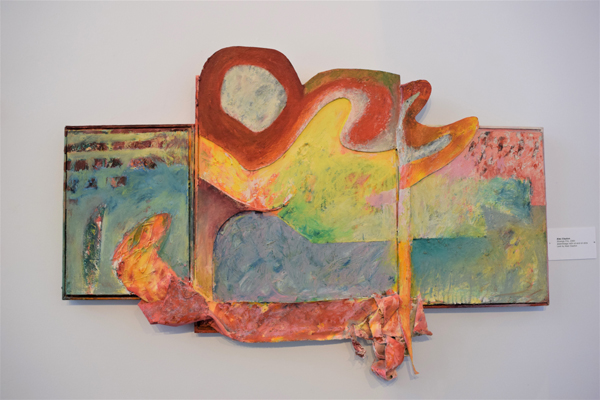by Christina Butcher for OLY ARTS
When artists stop creating art in one medium, they most likely start in another. Whether the transition is from painting to sculpting, drawing to writing or dancing to photography, the chances of an artist being truly “done” with art are slim to none. When talking about Alec Clayton, Olympia’s widely known art critic, author and retired painter, the sentiment could not ring truer. This summer, fans of Clayton’s work across the media have a rare opportunity to delve into his former focus, painting, at the Alec Clayton retrospective exhibit at the Tacoma Community College art gallery.
“It is validation,” said Clayton, “not just of a part of my work, but of the value of my entire body of work over a lifetime. No other exhibitions I’ve had in the past covered works over such a long period of time: from 1973 to 2009.”
Curated by Clayton himself and installed by TCC gallery coordinator Dr. Jennifer Olson-Rudenko, the retrospective exhibit hosts 47 paintings and sculptures of varying size and content. Most of the pieces were created using oil bars and oil sticks on canvas layered over an acrylic underpainting. While most of the paintings are abstract, Clayton included several pieces that feature human figures, faces and body parts. The paintings’ content varies greatly in pattern, shape and color palette, but most of Clayton’s work reveals an underlying tension suggestive of deeper meaning and emotion than initially brought to mind by his bright color choices and movement.
“The paintings are colorful and exuberant,” said Clayton, who holds a master’s degree in drawing and painting from East Tennessee State University. “They make people happy. But there is also, in some, an underlying feeling of, perhaps, danger. I do hope people come away having experienced them emotionally and, through the paintings, having gained a greater appreciation of the interactions of color, shape and texture.”
Originally from Tupelo, Mississippi, Clayton has been creating art since he was a young boy. “My mother was a painter, and as early as I can remember I wanted to be an artist,” he explained. “She set up a small easel for me next to hers, and I did my first oil painting when I was six years old.” After moving to Tennessee, New York City and then back to Mississippi, Clayton and his wife, Gabi Clayton, finally settled in Olympia in 1988. He continued to develop his distinct artistic style and cultivate a vast body of work until 2002, when he suffered a heart attack and underwent open-heart surgery. After that, Clayton could no longer withstand the physical exertion that painting demanded of his body. He painted less and less until 2009, when he stopped working in the medium altogether and focused on writing instead. His retrospective exhibit at TCC is meant partly as a formal goodbye to the world of painting.
While Clayton no longer paints, he’s far from “done” with art. He published his eighth novel, Tupelo, in September 2016, and regularly contributes art and theater reviews in Pacific Northwest publications including OLY ARTS, The Tacoma News-Tribune and The Weekly Volcano. He published a collection of arts reviews and commentary in 2008, titled As If Art Matters. “Being a critic has helped me to see what works and what doesn’t for other artists, which obviously helps with my own work,” said Clayton. “I suspect that if I were not a critic, I would have quit growing as an artist long ago.”
Clayton and his wife founded Mud Flat Press, a small publishing company, together in 2009. They continue to support and participate in the arts communities of Tacoma and Thurston County and are active volunteers with Parents, Family and Friends of Lesbians and Gays in Olympia.
What: Alec Clayton retrospective exhibit
When: 10 a.m. – 5 p.m. Mondays-Thursdays through Aug. 11;
artist reception 4–6 p.m. Thursday, July 20
Where: The Gallery at Tacoma Community College (Building 4),
6501 S. 19th St., Tacoma
How much: free
Learn more: 253-460-4306 | Categories Alec Clayton, Archives, Artists Profiles, Books and Words, Christina Butcher, Theater, Visual

